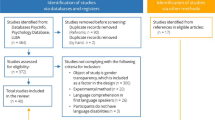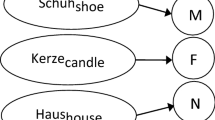Abstract
The paper reviews empirical evidence on the processing of grammatical gender during language comprehension, mainly focusing on gender priming. Evidence comes from behavioral experiments investigating gender priming and from behavioral as well as neurophysiological experiments evaluating the interaction of gender priming with semantic information. While the behavioral data do not provide a completely unambiguous picture, the neurophysiological data and the most reliable behavioral effects are more in line with a modular than with an interactive view of lexical access.
Similar content being viewed by others
REFERENCES
Bates, E., Devescovi, A., Pizzamiglio, L., D'Amico, S., & Hernandez, A. (1995). Gender and lexical access in Italian. Perception & Psychophysics, 57(6), 847-862.
Bates, E., Devescovi, A., Hernandez, A., & Pizzamiglio, L. (1996). Gender priming in Italian. Perception and Psychophysics, 58(7), 992-1004.
Carello, C., Lukatela, G., & Turvey, M. T. (1988). Rapid naming is affected by association but not by syntax. Memory and Cognition, 16(3), 187-195.
Dell, G. S., & O'Seaghdha, P. G. (1992). Inhibition in interactive models of linguistic selection and sequencing. In D. Dagenbach & T. H. Carr (Eds.), Inhibitory processes in attention, memory and language (pp. 409-453). San Diego, CA: Academic Press.
Deutsch, A., Bentin, S., & Katz, L. (this issue). Semantic influence on processing gender agreement: Evidence from Hebrew.
Friederici, A. D. (1995). The time course of syntactic activation during language processing: A model based on neuropsychological and neurophysiological data. Brain and Language, 50, 259-281.
Friederici, A. D., & Schriefers, H. (1994). The nature of semantic and morphosyntactic context effects on word recognition in young healthy and aphasic adults. Linguistische Berichte, Special Issue, 6, 9-32.
Friederici, A. D., Frisch, S., & Steinhauer, K. (1998). Lexical integration: Sequential effects of syntactic and semantic information. Memory & Cognition, In press.
Friederici, A. D., Pfeifer, E., & Hahne, A. (1993). Event-related brain potentials during natural speech processing: Effects of semantic, morphological and syntactic violations. Cognitive Brain Research, 1, 183-192.
Grosjean, F., Dommergues, J., Cornu, E., Guillelmon, D., & Besson, M. (1994). The gender marking effect in spoken word recognition. Perception & Psychophysics, 56, 590-598.
Gunter, T. C., Friederici, A. D., & Schriefers, H. (Submitted). Syntactic gender and semantic expectancy: ERPs reveal early autonomy and late interaction.
Gurjanov, M., Lukatela, G., Lukatela, K., Savic, M., & Turvey, M. T. (1985). Grammatical priming of inflected nouns by the gender of possessive adjectives. Journal of Experimental Psychology: Learning, Memory and Cognition, 11(4), 692-701.
Hagoort, P., Brown, C., & Groothusen, J. (1993). The syntactic positive shift as an ERP-measure of syntactic processing. Language and Cognitive Processes, 8, 439-483.
Hahne, A., & Friederici, A. D. (Submitted). On the independence of early syntactic processes from semantic and attentional factors: Evidence from ERPs during auditory sentence comprehension.
Jescheniak, J., & Levelt, W. J. M. (1994). Word frequency effects in speech production: retrieval of syntactic information and of phonological form. Journal of Experimental Psychology: Learning, Memory, and Cognition, 20, 824-843.
Kluender, R., & Münte, T. F. (1998). ERPs to grammatical and ungrammatical subject/object asymmetries in German wh-questions. Paper presented at the 11th Annual CUNY conference on human sentence processing, New Brunswick, New Jersey.
Kutas, M., & Hillyard, S. A. (1984). Brain potentials during reading reflect word expectancy and semantic association. Nature, 307, 161-163.
Levelt, W. J. M., Schriefers, H., Vorberg, D., Meyer, A. S., Pechmann, T., & Havinga, J. (1991). The time course of lexical access in speech production: A study of picture naming. Psychological Review, 98(1), 122-142.
Levelt, W. J. M., Roelofs, A., & Meyer, A. S. (1999). A theory of lexical access in speech production. The Behavioral and Brain Sciences, 22(1), 1-75.
Lorch, R. F., Balota, D. A., & Stamm, E. G. (1986). Locus of inhibition effects in the priming of lexical decisions: Pre-or postlexical access? Memory & Cognition, 14, 95-103.
Marslen-Wilson, W. D. (1987). Functional parallelism in spoken word recognition. Cognition, 25, 71-102.
Münte, T. F., Heinze, H. J., & Mangun, G. R. (1993). Dissociation of brain activity related to syntactic and semantic aspects of language. Journal of Cognitive Neuroscience, 5, 335-344.
Neville, H. J., Nicol, J. Barss, A., Forster, K. & Garrett, M. (1991). Syntactically based sentence processing classes: Evidence from event-related brain potentials. Journal of Cognitive Neuroscience, 3, 155-170.
O'Seaghdha, P. G. (1997). Conjoint and dissociable effects of syntactic and semantic context. Journal of Experimental Psychology: Learning, Memory and Cognition, 23(4), 807-828.
Osterhout, L., & Holcomb, P. J. (1992). Event-related brain potentials elicited by syntactic anomaly. Journal of Memory and Language, 31, 785-804.
Radeau, M. & van Berkum, J. J. A. (1996). Gender decision. Language and Cognitive Processes, 11(6), 605-610.
Roelofs, A. (1992). A spreading-activation theory of lemma retrieval in speaking. Cognition, 42, 107-142.
Rösler, F., Friederici, A. D., Pütz, P., & Hahne, A. (1993). Event-related brain potentials while encountering semantic and syntactic constraint violations. Journal of Cognitive Neuroscience, 5, 345-362.
Schmidt, R. (1986). Was weiss der Artikel vom Hauptwort? Ein Beitrag zur Verarbeitung syntaktischer Beziehungen beim Lesen. Zeitschrift für experimentelle und angewandte Psychologie, 33, 150-163.
Schriefers, H., Friederici, A. D., & Rose (1998). Context effects in visual word recognition: Lexical relatedness and syntactic context. Memory & Cognition, 26, 1292-1303.
Schriefers, H. & Jescheniak, J. D. (1999). The representation and processing of grammatical gender in language production. Journal of Psycholinguistic Research, (in press).
Seidenberg, M. S., Tanenhaus, M. K., Leiman, J. M., & Bienkowski, M. (1982). Automatic access of the meanings of ambiguous words in context: Some limitations of knowledgebased processing. Cognitive Psychology, 14, 489-537.
Seidenberg, M. S., Waters, G. S., Sanders, M., & Langer, P. (1984). Pre-and postlexical loci of contextual effects on word recognition. Memory & Cognition, 12, 315-328.
Swinney, D. (1979). Lexical access during sentence comprehension: (Re)consideration of context effects. Journal of Verbal Learning and Verbal Behavior, 18, 645-659.
Tanenhaus, M. K., Dell, G. S., & Carlson, G. (1987). Context effects and lexical processing: A connectionist approach to modularity. In J. L. Garfield (Ed.), Modularity in knowledge representation and natural-language processing (pp. 83-108). Cambridge, MA: MIT Press.
Tanenhaus, M. K., Leiman, J., & Seidenberg, M. (1979). Evidence for multiple stages in the processing of ambiguous words in syntactic contexts. Journal of Verbal Learning and Verbal Behavior, 18, 427-440.
Tanenhaus, M. K., & Lucas, M. M. (1987). Context effects in lexical processing. Cognition, 25, 213-234.
van Berkum, J. J. A. (1996). The psycholinguistics of grammatical gender. Nijmegen: Nijmegen University Press.
West, R. F., & Stanovich, K. E. (1982). Source of inhibition in experiments on the effect of sentence context on word recognition. Journal of Experimental Psychology: Learning, Memory and Cognition, 5, 385-399.
West, R. F., & Stanovich, K. E. (1986). Robust effects of syntactic structure on visual word processing. Memory and Cognition, 14, 104-112.
Wicha, N. Y., Hernandez, A., Reyes, I., de Barreto, L. G., & Bates, E. A. (1997). When zebras become painted donkeys: The interplay between gender and semantic priming in a Spanish sentence context. CRL.UCSD Technical Report 9701. University of California, San Diego.
Wright, B., & Garrett, M. (1984). Lexical decision in sentences: Effects of syntactic structure. Memory and Cognition, 12, 25-64.
Author information
Authors and Affiliations
Rights and permissions
About this article
Cite this article
Friederici, A.D., Jacobsen, T. Processing Grammatical Gender During Language Comprehension. J Psycholinguist Res 28, 467–484 (1999). https://doi.org/10.1023/A:1023264209610
Issue Date:
DOI: https://doi.org/10.1023/A:1023264209610




